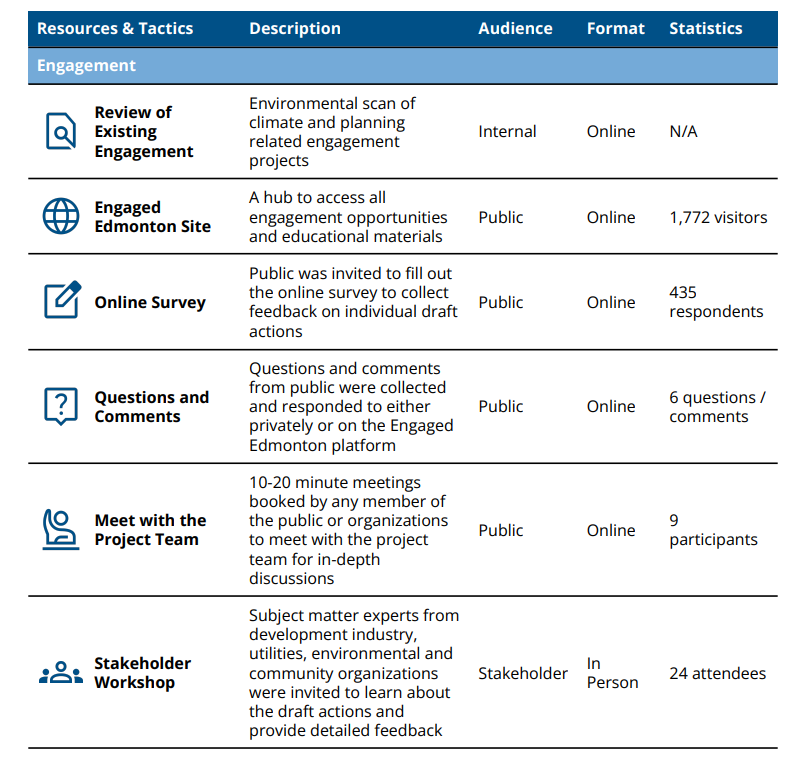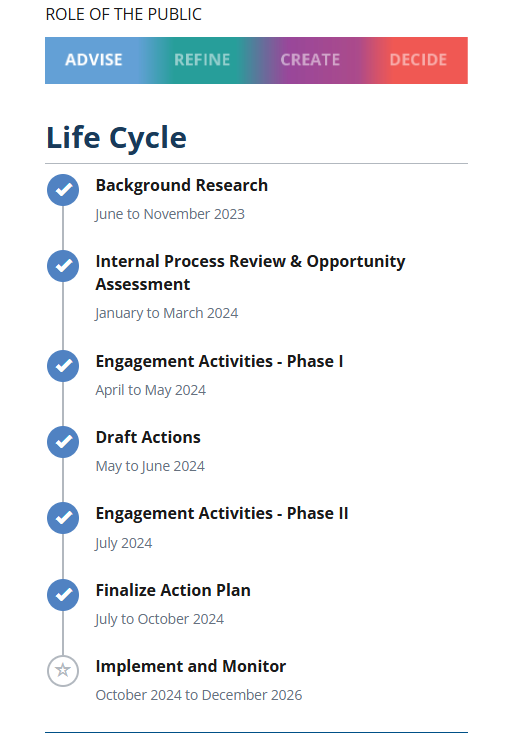Canada
City of Edmonton
Engagement phase between April and October 2024
The Climate Resilience Planning and Development Action Plan for Edmonton aims to make the city more resilient to the impacts of climate change by integrating adaptation and mitigation measures into urban planning and development processes. This plan identifies 15 key actions to be implemented from 2024 to 2026 to integrate climate resilience throughout the planning and development continuum, from strategic planning to construction and occupancy of buildings.
The main objective of this plan is to reduce greenhouse gas emissions (mitigation) and strengthen Edmonton's resilience to climate change (adaptation) through concrete actions. These actions aim to create resilient neighbourhoods, implement climate-adaptive design and construction standards, develop appropriate urban infrastructure, and integrate resilience strategies into the city's development processes. The plan also seeks to promote an energy transition aligned with Edmonton's climate strategies.
Participants in this project include both the residents of Edmonton, local stakeholders, and various actors involved in the city's planning and development, such as urban planners, architects, infrastructure officials, and climate experts. It is also essential for the City of Edmonton to naturally include indigenous populations in all debates, to represent all communities and to invite industrial professionals from the energy and environmental sectors.
Residents were invited to participate in two external engagement phases in 2024, where they shared feedback on the opportunities and challenges of climate resilience in the city, as well as the proposed action plan. The results of these consultations were used to refine and prioritize the proposed actions, with particular attention to feedback from residents and stakeholders on the draft action plan.
Edmonton is the capital of the province of Alberta, located in western Canada along the North Saskatchewan River. The city is distinguished by its climate, with very cold, long winters. In 2025, its population is estimated at around 1.1 million. Edmonton is also renowned for its many festivals and its energy sector, notably oil and gas.
The Climate Resilience Planning and Development Action Plan for Edmonton is an ambitious initiative to integrate climate resilience measures into the city's urban planning. Designed in response to a commitment made by the city council, this plan is based on a series of strategic actions and revisions to existing construction standards. It aligns with the Edmonton Community Energy Transition Strategy (2021) and the Edmonton Climate Adaptation Strategy (2018), which emphasize the importance of planning and development in achieving carbon neutrality.
The methodology of the action plan is based on a combination of background research, internal reviews, and targeted stakeholder engagement sessions in April 2024. These consultations gathered feedback that informed the development of the 15 planned actions, such as integrating resilient standards into the design and construction standards of the city, expanding the climate resilience policy to cover all urban development, and improving the resilient neighbourhood design.
For example, updates to design standards could include requirements for drought-resistant infrastructure, the use of native plants, and enhanced drainage systems to cope with extreme climate events.
Engagement included an in-person workshop with stakeholders (subject matter experts representing organizations related to real estate and development, utilities and energy; community; and environment and sustainability) and an Engaged Edmonton webpage which hosted an online survey, question and answer, bookings for one-on-one meetings with the project team, and essential materials to understand the draft Action Plan. The engagement opportunities were shared broadly with Edmontonians via social media and newsletters and shared directly with numerous organizations that serve equity-deserving communities.

Special attention is given to aligning this plan with the council's priorities and community feedback. The public consultation process plays a central role in refining and prioritizing the actions. The consultation process ensures that the proposed actions meet the community's expectations while being achievable within the city's climate goals.
The impact of this plan will be closely monitored through a system of regular monitoring and reporting, which will allow tracking of progress. The ongoing evaluation of the actions taken will ensure that Edmonton is advancing towards its goal of becoming a more resilient city in the face of climate challenges. Integrating these strategies into urban development processes and implementing adaptive standards should lead to safer and more sustainable neighbourhoods that can meet the challenges of an ever-evolving climate.

More informations:
Climate Resilience Planning and Development Action Plan: https://engaged.edmonton.ca/crpdactionplan
CRPD Action Plan Overview: https://hdp-ca-prod-app-edm-engaged-files.s3.ca-central-1.amazonaws.com/1117/2896/0617/bf917d8d0bd0023a86f8073d62dc5641_CRPD_Action_Plan_-_Overview.pdf
CRPD Action Plan What We Heard Report : https://hdp-ca-prod-app-edm-engaged-files.s3.ca-central-1.amazonaws.com/2817/2896/0621/b8195f96596e4e41eca80d9e4deac80f_CRPD_Action_Plan_-_What_We_Heard_Report_-_Part_2.pdf